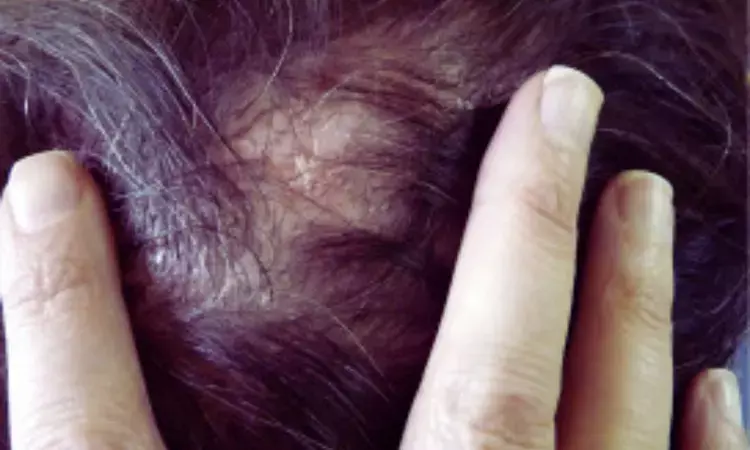- Home
- Medical news & Guidelines
- Anesthesiology
- Cardiology and CTVS
- Critical Care
- Dentistry
- Dermatology
- Diabetes and Endocrinology
- ENT
- Gastroenterology
- Medicine
- Nephrology
- Neurology
- Obstretics-Gynaecology
- Oncology
- Ophthalmology
- Orthopaedics
- Pediatrics-Neonatology
- Psychiatry
- Pulmonology
- Radiology
- Surgery
- Urology
- Laboratory Medicine
- Diet
- Nursing
- Paramedical
- Physiotherapy
- Health news
- Fact Check
- Bone Health Fact Check
- Brain Health Fact Check
- Cancer Related Fact Check
- Child Care Fact Check
- Dental and oral health fact check
- Diabetes and metabolic health fact check
- Diet and Nutrition Fact Check
- Eye and ENT Care Fact Check
- Fitness fact check
- Gut health fact check
- Heart health fact check
- Kidney health fact check
- Medical education fact check
- Men's health fact check
- Respiratory fact check
- Skin and hair care fact check
- Vaccine and Immunization fact check
- Women's health fact check
- AYUSH
- State News
- Andaman and Nicobar Islands
- Andhra Pradesh
- Arunachal Pradesh
- Assam
- Bihar
- Chandigarh
- Chattisgarh
- Dadra and Nagar Haveli
- Daman and Diu
- Delhi
- Goa
- Gujarat
- Haryana
- Himachal Pradesh
- Jammu & Kashmir
- Jharkhand
- Karnataka
- Kerala
- Ladakh
- Lakshadweep
- Madhya Pradesh
- Maharashtra
- Manipur
- Meghalaya
- Mizoram
- Nagaland
- Odisha
- Puducherry
- Punjab
- Rajasthan
- Sikkim
- Tamil Nadu
- Telangana
- Tripura
- Uttar Pradesh
- Uttrakhand
- West Bengal
- Medical Education
- Industry
Chronic Inflammation in Scarring Alopecia May Heighten Skin Cancer Risk, Review Finds

USA: A recent literature review published in Skin Appendage Disorders has raised concerns about a possible link between primary scarring alopecia and a heightened risk of developing skin cancers, particularly on the scalp. The review suggests that the persistent inflammation and follicular damage seen in scarring alopecia could contribute to the development of non-melanoma skin cancers (NMSCs), including squamous cell carcinoma (SCC) and basal cell carcinoma (BCC).
Primary scarring alopecia, a group of rare but chronic conditions, is marked by permanent hair loss caused by the destruction of hair follicles through ongoing inflammation. These disorders are broadly classified based on the type of inflammatory response involved—lymphocytic, neutrophilic, or mixed. The prolonged inflammatory environment that characterizes these conditions may damage follicles irreversibly and provide a setting in which abnormal cell growth is more likely.
Juwon Lee, Dr. Phillip Frost Department of Dermatology and Cutaneous Surgery, University of Miami Miller School of Medicine, Miami, FL, USA, and colleagues analyzed findings from 13 studies, focusing on subtypes such as lichen planopilaris (LPP), discoid lupus erythematosus (DLE), folliculitis decalvans (FD), and erosive pustular dermatosis of the scalp (EPDS). Across these subtypes, several cases of SCC and BCC were reported, suggesting that while the development of skin cancer in these patients is uncommon, it is not insignificant.
Key Findings:
- In lichen planopilaris (LPP) and discoid lupus erythematosus (DLE), the development of skin cancer is often linked to chronic inflammation and ultraviolet (UV) radiation exposure.
- Long-term use of steroids may also contribute to skin cancer risk, but most patients who developed cancer were not on intensive immunosuppressive therapy.
- This suggests that chronic inflammation, rather than immunosuppression, maybe the main factor driving cancer development in scarring alopecia.
- In alopecia areata, a non-scarring form of hair loss where steroids are also widely used, patients do not show an increased risk of skin cancer.
- The lack of cancer association in alopecia areata reinforces the theory that inflammation, not steroid use, is the key contributor to cancer in scarring alopecia.
- In erosive pustular dermatosis of the scalp (EPDS), where both inflammation and UV exposure are present, cancer risk cannot be attributed to sun damage alone.
- People with alopecia totalis, who are also exposed to UV radiation due to total hair loss, have a lower risk of skin cancer, supporting the role of chronic inflammation over UV exposure.
Given these findings, the authors emphasize the need for heightened vigilance in monitoring patients with chronic scarring alopecia. Regular dermatological check-ups, patient education on sun protection, and early intervention strategies are recommended to help detect and manage potential skin cancers at an early stage.
"While more research is necessary to understand fully the mechanisms behind this association, the review reinforces the importance of considering long-term risks in managing chronic inflammatory scalp disorders," the authors concluded.
Reference:
Juwon Lee, Ludovica de Gregorio, Antonella Tosti; Scarring Alopecia and Risk of Skin Cancer: A Literature Review. Skin Appendage Disord 2025; https://doi.org/10.1159/000545345
Dr Kamal Kant Kohli-MBBS, DTCD- a chest specialist with more than 30 years of practice and a flair for writing clinical articles, Dr Kamal Kant Kohli joined Medical Dialogues as a Chief Editor of Medical News. Besides writing articles, as an editor, he proofreads and verifies all the medical content published on Medical Dialogues including those coming from journals, studies,medical conferences,guidelines etc. Email: drkohli@medicaldialogues.in. Contact no. 011-43720751


